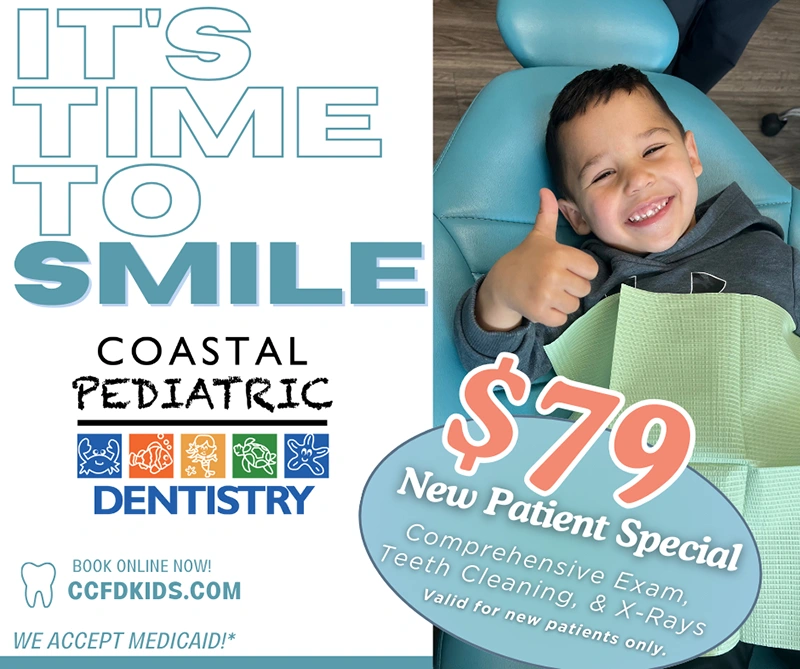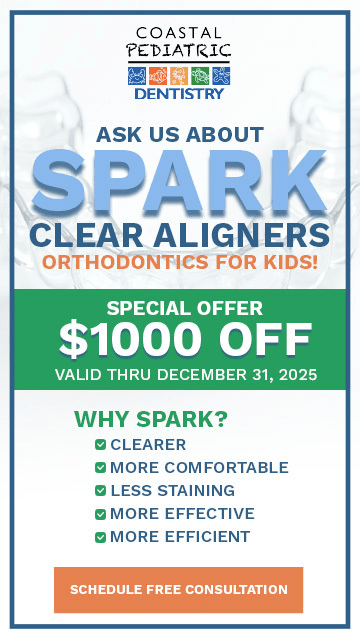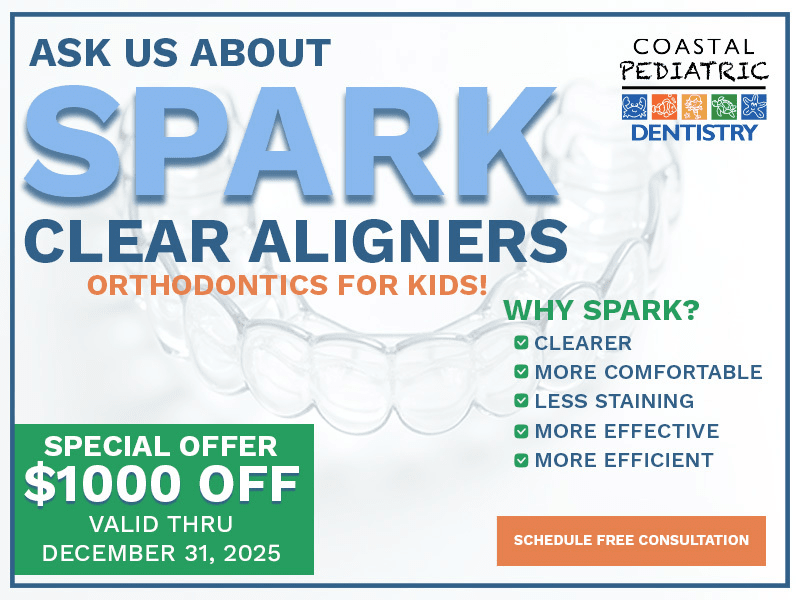Why are Baby Teeth so Important?
Since baby teeth are temporary, many parents assume baby teeth aren’t important. If Coastal Pediatric Dentistry finds a cavity in a primary tooth it’s no biggie – after all it will fall out. While this thinking is understandable, it is an out-of-date way to understand pediatric oral health.
Cavities…the basics
According to the American Academy of Pediatric Dentistry, one in five children experience decay before age 5. Cavities, or dental caries as your dentist calls them – are actually a contagious dysfunction of the oral biofilm (wait..what?!) Let’s back up a few steps, shall we? Bacteria cause cavities. Everyone has something called a biofilm on their teeth. A biofilm is a network of sticky bacteria. When the network of bacteria is healthy your child is at low risk for decay. But, if the biofilm starts to mutate and become overrun with bad bacteria, cavities form. Cavities hurt and the pain can affect children’s sleep, schooling and behavior.
If your dentist finds a cavity, they may make several suggestions for intervention. Your child may have sealants placed, get a filling, a crown, or in extreme cases, have the tooth pulled. It may be tempting to suggest pulling the tooth—after all it is going to fall out anyway, why spend the money to repair it? But, baby teeth serve many important functions for your child’s health and development. Extraction should be the last option for treatment.
What do baby teeth do?
- Help children chew and swallow nutritious foods
- Help with speech development
- Help children’s jaw bones grow and develop
- Prevent atrophy of the jaw
- Hold space for permanent teeth to come through in the right place
The best way to establish good long term oral health is to keep baby teeth healthy.
How to prevent decay in baby teeth
The American Dental Association encourages parents to take their children to see the dentist within 6 months of their first tooth coming in – and no later than their first birthday. Seeing the dentist regularly is one of the best ways to stay on top of your child’s oral health. Other ways to prevent tooth decay from impacting baby teeth include:
- Brush teeth twice a day
- Limit snacking
- Provide a balanced diet
- Do not share pacifiers or utensils with your child
- Don’t let your child fall asleep with a bottle of sippy cup
- Limit drinks to milk and water
- Brush your child’s teeth until age 6
It’s not always easy to focus on your child’s oral health. Often children resist the toothbrush or sitting still for an exam. Make sure you ask Coastal Pediatric Dentistry for tips to keep brushing fun for your child.
Treatment Options for Baby Teeth
If your child is at high risk for cavities, your dentist may suggest sealants. Dental sealants are effective at protecting teeth from decay. Sealants are a thin layer of plastic painted on the chewing surface of molars. Decay causing bacteria cannot penetrate the sealant, protecting the teeth. If the decay has progressed into the enamel, your child will need a filling. Fillings can be scary because of the shot needed to numb the tooth. Some dentists offer nitrous oxide (laughing gas) to help children through the process. If the decay is too advanced to treat with a filling your child will need a crown. A crown is a metal or ceramic cap placed over the remaining tooth structure.
Restoring the tooth to function is far better long-term than extracting the tooth. If extraction is the only option, your dentist may suggest a space maintainer.
Resources for Parents
There resources online to help encourage kids to maintain good oral health habits. The first resource, of course should be your dentist. If you haven’t had your child in for an exam yet, or it has been a while, call Coastal Pediatric Dentistry to schedule your child’s checkup.
Other great resources for parents include:
American Academy of Pediatrics Healthy Children.org
American Academy of Pediatrics Parent Resources
Baby Teeth Matter
Baby teeth matter to the healthy growth and development of your child. When teeth are unhealthy, children aren’t set up to meet their full potential. Make sure to keep your child on track and schedule their next appointment today!
“The content of this blog is not intended to be a substitute for professional medical advice, diagnosis, or treatment. Always seek the advice of qualified health providers with questions you may have regarding medical conditions.”
















